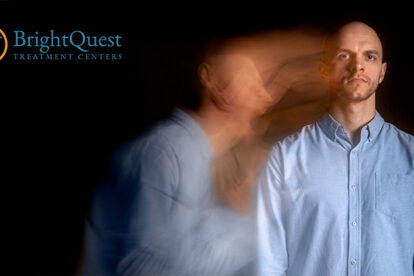Can Anxiety Lead to Psychosis? Treating Psychotic Disorders vs Anxiety with Psychotic Features

It is possible for anxiety to lead to psychosis symptoms when a person’s anxiety is particularly severe. However, such an instance of psychosis is different from an actual psychotic disorder in the cause and treatment approaches. Regardless of the root disorder, it’s important that someone receives an accurate diagnosis and urgent treatment for psychotic features and the disorder underlying them.
When Christine gave birth to Ben, she was determined to keep her anxiety under control so she could give him the best care and love possible. But at the time, she wasn’t getting any treatment for her disorder. To complicate matters, the pressure she was putting on herself to keep things under control was, in fact, aggravating her anxiety under the surface.
On days when she was particularly stressed and anxious, she would hear a baby crying from somewhere close by. She’d go check Ben’s room, but he was napping soundly. Again, she’d hear the crying and check just to be sure. She recognized that the crying wasn’t Ben, and it wasn’t actually coming from a real source at all. But that realization didn’t help make the crying go away.
She wondered, can anxiety lead to psychosis? Or did she have another problem taking hold in her mind? It wasn’t until she visited a treatment center that she was able to find some answers—and some relief for her distress.
Is It True That Anxiety Can Lead to Psychosis?
When someone’s anxiety disorder is bad enough that they suffer from panic and anxiety attacks, it is possible for them to simultaneously experience symptoms of psychosis. But the nature of this experience is different and distinct from an actual psychotic disorder.
What Are the Symptoms of Psychosis?
When a person is experiencing symptoms of psychosis, they have lost touch with reality in some way. It becomes difficult to experience the external world as it really is. They may perceive things that aren’t really there.
- Hallucinations can be visual or auditory. A person may hear voices or see things that aren’t there in reality.
- Delusions are beliefs that aren’t based in reality.
- Paranoia can take delusional beliefs to another level as the person experiences intense fear over perceived threats.
Not only can severe anxiety trigger these symptoms, but psychosis can also contribute enormously to a person’s greater distress. Their anxiety symptoms may get worse in response to the psychotic features themselves, as well as the realization that they are losing control of their mind in the moment. However, unlike a psychotic disorder, the symptoms of psychosis related to anxiety are not provoked by an original psychotic disorder.
|
Psychotic Disorders |
Anxiety with Psychotic Features |
|
|
|
|
|
|
|
|
Call For a Confidential Phone Assessment.
619-466-0547How Does Treatment Differ for Psychotic Disorders and for Anxiety with Psychotic Features?
True psychotic disorders include schizophrenia, schizophreniform disorder, schizoaffective disorder, brief psychotic disorder, and delusional disorder. Like anxiety, major depression can also provoke psychotic features. Certain substances, such as meth and cannabis, can induce psychotic symptoms. And medical conditions—a brain tumor, for example—can sometimes lead to psychosis as well.
Whereas true psychotic disorders are treated with antipsychotic medications, this type of treatment is not appropriate for psychosis induced by an anxiety disorder. Because, in this case, the symptoms of psychosis were triggered by an overwhelming episode of anxiety, the appropriate treatments, including medications, target the anxiety itself. For psychotic disorders and for anxiety disorders with psychotic features, individual psychotherapy is very important to help individuals manage stress and develop healthy coping strategies.
Because treatment approaches differ depending on the causes and triggers of psychosis, an accurate diagnosis is absolutely critical.
What Is the Best Recovery Approach for Anxiety and Psychosis?
If a diagnosis is delayed or misapplied, a person will not be able to receive the necessary treatment, and their condition can significantly worsen. Therefore, if you or someone you know has experienced psychotic symptoms, it’s important to get clinical attention right away. You can speak to a primary care physician for a referral, contact a psychiatrist directly, or reach out to a treatment center that specializes in mental and behavioral health.
Anxiety disorders and psychosis are both very serious and distressing. If left untreated, risks increase for co-occurring substance use disorders, as well as suicidal thoughts and attempts, unemployment, and other kinds of harm. Severe anxiety alone calls for long-term treatment. With the compounding challenges of psychosis, the need for expert care and mental health rehabilitation is urgent. In a comprehensive treatment setting, clients receive complete and continuing assessments, as well as individualized treatment plans that take into account all personal concerns and co-occurring issues. Over time, in this welcoming environment, clinicians can help clients to address the root causes of their distress—beyond the psychotic symptoms alone. This journey becomes an opportunity to realign one’s life with enduring support and resources for the future.
Treatment at BrightQuest
BrightQuest Treatment Centers provide world-class residential treatment for anxiety disorders and other complex mental illnesses. We know that choosing the right treatment option for yourself or a loved one is difficult. We believe our unique model of care gives our clients the best chance at success.
- Family Integration in Treatment
- Inclusive Therapeutic Community
- Focus on Lasting Behavioral Change
We offer clients the tools, skills, and support necessary to attain greater stability and independence with the confidence and courage to live a healthy, happy, and productive life.






